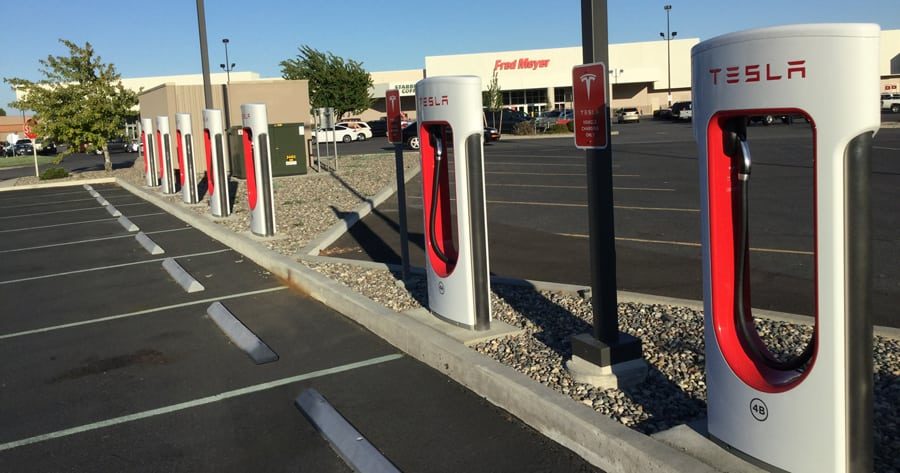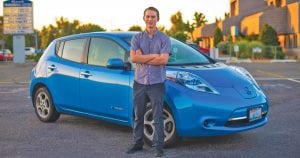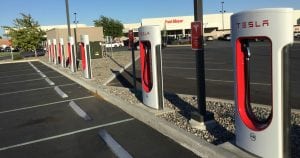
Home » Electric car charging station numbers on the rise, giving drivers more options
Electric car charging station numbers on the rise, giving drivers more options

August 16, 2016
By Jeff Morrow
Jeff Clark knew the new five-story, 663-space parking garage at Kadlec Regional Medical Center in Richland was going to need some electric-car charging stations.
“There is a growing interest in electric vehicles,” said Clark, vice president of support services for Kadlec, at a recent ribbon cutting ceremony for the garage.
The garage has two EV Link chargers that can be used free of charge.
“Another three are coming from Tesla,” Clark said.
All told, the garage has the capacity for 14 chargers.
It’s called planning for the future.
The website www.plugshare.com shows there are 23 electric car charging station locations in the Tri-Cities.
According to Green Car Reports, Tesla projects 2016 worldwide sales of its electric cars to be between 80,000 and 90,000. The company also believes it will produce 500,000 cars by 2018.
Very few people own a Tesla in the Tri-Cities. They can cost upward of $90,000.

But many Tri-Citians drive a Nissan Leaf, Volkswagen E-Golf, Chevy Volt, or any number of other electric cars.
“What’s not to like about an electric vehicle?” asked Robin Rego, manager, generation project development at Energy Northwest. “I happen to own a Chevy Volt. It’s quiet. It’s smooth. It’s fast.”
Rego uses it to get around the Tri-Cities.
“I use it to come to work at Energy Northwest,” he said. “I live in Kennewick, and it’s a 22-mile round trip. My electric bill has only gone up $10 a month. With the reduced price of gas, I’m getting about 100 miles a gallon.”
Garrett Brown is the president of the Mid-Columbia Electric Vehicle Association. He’s driven an electric vehicle for the last five years.
The PNNL scientist echoes Rego’s praises of the electric car.
“They’re fun to drive, quiet, quick and smooth,” Brown said. “And you charge them at night, just like your cellphone. You can buy a used one for less than $10,000.”
And, Rego notes, because it uses an electric motor, there are even fewer parts to maintain.
Jeff Jackson, a certified sales and leasing consultant for Bill Robertson Nissan in Pasco, said more people will be driving electric cars in the near future.
“Everything you see states that by the year 2020, 25 to 30 percent of the cars you see on the road will be electric,” said Jackson, who has sold more than 100 electric cars since 2011. “Now, people are waiting for the cars with longer ranges. It’s going to be huge.”
Nissan has committed to a large lithium-ion battery plant, to be built in England, to make more electric cars.
And Gary Petersen, vice president of federal programs for the Tri-City Development Council (TRIDEC), said the Tri-Cities has one of the highest number of Nissan Leaf owners per capita in the region.
And he believes more people will catch on.
“Like anything else, a trend usually starts with a drip, then a flow, before it gushes,” he said. “The thing that’s slowed it down is cheap gas prices. But this is a learned community. People here believe in global warming.”
But there are a few problems with electric cars.
Petersen noted that they perform better on flat roads. “It really saps power going up hill,” he said. On the other hand, going downhill saves power.”
Charging has been another issue.
A Phase 1 charger can take up to 22 hours for a full charge. There are Phase 1 chargers at the Gesa Credit Union offices on Gage Boulevard in Richland, but they’re rarely used because it’s unlikely someone would sit in the parking lot for that long for a charge.
A Phase 2 charger takes anywhere from 6 to 8 hours. That’s what Kadlec installed in its new parking garage.
“The charging station at Gesa isn’t convenient. But if you go to Kadlec and spend two hours to visit, this is a useful place,” Brown said. “In two hours, I can get 60 miles of range.”
Phase 3 chargers, which are starting to come out, can charge within 30 minutes.
Jackson said there are five charging stations at the Bill Robertson Nissan complex, all for free use for customers.
And there are eight Tesla charging stations at the Kennewick Fred Meyer store.
“It’s really hit and miss,” said Jared Lang, a department manager at the store. “Sometimes you won’t see someone charging their car there for a whole day. Then you’ll see three of them in one day.”
Lang estimates there are about 10 cars a week that get charged up at the Tesla stations – for free – and it takes about 45 minutes for a whole charge.

Those Tesla charging stations have only recently been installed around the country. There are some in Ellensburg.
Brown said it costs him 7 cents a kilowatt-hour to charge his car, and he can get by on $1.50 with his Nissan Leaf.
“I think this is a benefit to the community to clean the air,” he said.
Many of the charging stations are free to use, as long as the car and battery are compatible. But some do cost, such as the charging stations at PNNL.
“The Department of Energy told PNNL, ‘You can do whatever you want, but it comes out of your budget,’” Brown said.
So PNNL charges $1.50 – still way cheaper than gas.
People like Rego and Petersen want to see more charging stations – not just Tesla stations but others – installed in Eastern Washington.
“This region is an underserved corridor,” said Rego, who said a Phase 3 charger costs between $70,000 and $100,000. “The bottom line is, if we build it, they will come.”
Rego is part of a group called EVITA (Electric Vehicle Infrastructure Transportation Alliance), which is a project involving Energy Northwest, local utilities and TRIDEC, and sponsored by the Mid-Columbia Energy Initiative.
The group’s objective is “to advocate for sustainable electric transportation infrastructure by promoting public and private partnerships in developing DC fast-charging stations throughout the service areas of local utilities in Benton and Franklin counties, as well as along the major highways leading into the Tri-Cities area.”
If that happens, the infrastructure will be set.
It’s coming, Brown said.
“Changes in technology are very dramatic and very quick,” he said. “I am an advocate for charging stations in the Tri-Cities, and I think it’s gonna happen.”
Brown would like to see charging stations at the Columbia Center mall and the Toyota Center.
But Dave Comstock, who sells electric cars at Leskovar Mitsubishi, said that while charging stations are nice, “95 percent of all charges are done at home.”
Comstock believes that people won’t start buying the cars en mass until the technology gets better. That means a longer range of miles per charge.
“The problem with all cars is they have a limited range,” Comstock said. “People aren’t going to want to drive from the Tri-Cities to the Oregon Coast if they’re going to have to stop three times to charge the car. There is a reason it has not completely caught on here.”
Brown agrees distance travel is a problem.
“In the Tri-Cities, you will never have a problem driving in this area,” he said. “The problem is getting out of the Tri-Cities.”
Driving to Spokane? Or Walla Walla? Right now you’ll need a Tesla, he said.
“But in the next few years, cars are coming with a 200-mile range,” Brown said.
Rego also said Tesla has been taking orders for the Model 3, which is expected to come out next year or in 2018.
It’s supposed to be cheaper at $35,000, with a potential 200-mile range.
“The number of people who put down $1,000 on this car was 400,000,” Rego said. “That’s $4 million right there.”
There are two other things that may help the electric car’s cause.
Rego believes there are two big disincentives to using gas in our cars: Initiative 732, and Gov. Jay Inslee’s CAR (Clean Air Rule).
I-732 is the carbon emissions tax, which would place a tax on fossil fuels being used. It’s on the November ballot.
Inslee wants Clean Air Rules adopted by the end of this year.
“Between the two of them, there is going to be quite a price to pay for carbon emissions,” Rego said.
That would keep Brown from going to a place he never wants to be.
“I haven’t gone to a gas station in five years,” he said.
Local News Environment
KEYWORDS august 2016





